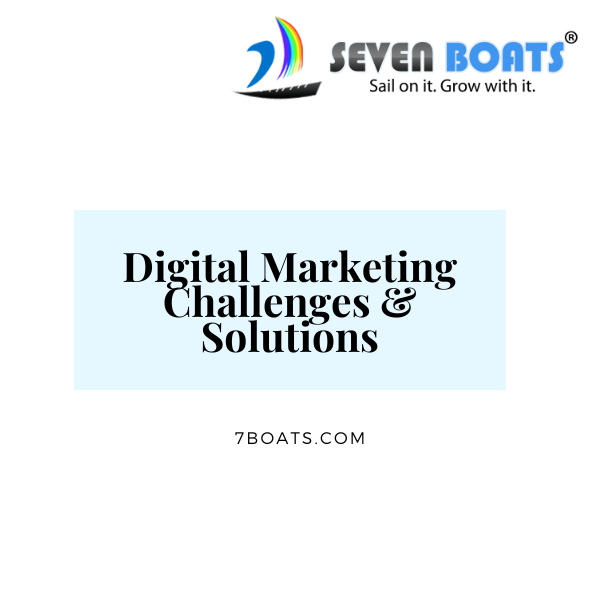
Digital Marketing Challenges : A guide to small business owners
It’s no secret that digital marketing can be overwhelming. As a small business owner, you may feel like the odds are stacked against you when it comes to competing in the ever-evolving online landscape. It’s time to take control and start tackling your digital marketing challenges with confidence! In this guide, we’ll walk you through different methods of leveraging technology for greater success – from using data to grow your reach and fine tuning targeting techniques to creating content optimized for social media platforms. You’ll also gain insight into potential pitfalls along the way and practical tips on how to avoid them. Ready to get started? Then let’s dive in!
Top Digital Marketing Challenges and Solutions
Digital marketing has become an increasingly popular form of advertising, but it does present unique challenges. Consumers rely heavily on ads that target their interests and preferences; if a company can’t deliver the content they want, the campaign may fall flat.
Additionally, digital marketing is energy-intensive relative to other forms of promotion.
Other lingering digital marketing challenges are –
- Ever Changing Platforms & Technology
- Competing with big brands and companies
- Unpredictable buying behaviour of consumers
- Shoe string budgets
- Consumer-centric market
- Creating fresh and engaging content
- Mobile-friendly content
- Short video content
- Data and Security challenges
- Content Strategy to stand out
- Fast-changing & unpredictable trends and updates
- Establishing EEAT (Experience, Expertise, Authority and Trust) in content
A few more top digital marketing challenges and solutions are given below –
- Challenge: Increased Competition and Saturation
Solution: Focus on Niche Targeting and Differentiation
To overcome the competition, identify a specific target audience and cater your marketing efforts to their unique needs. Differentiate your brand by highlighting your unique selling points and offering personalized experiences. - Challenge: Ad-blocking and Ad Fatigue
Solution: Optimize Content and Native Advertising
Create engaging, valuable, and non-intrusive content that resonates with your audience. Invest in native advertising, where your ads blend seamlessly with the platform’s content, increasing the chances of reaching your audience effectively. - Challenge: Data Privacy and Compliance
Solution: Ensure Transparency and Compliance
Prioritize data privacy and comply with relevant regulations (e.g., GDPR, CCPA). Clearly communicate your data collection practices to customers and obtain their consent before gathering any information. - Challenge: Shifting Social Media Algorithms
Solution: Diversify Content and Engage Consistently
Diversify your content across platforms and formats to adapt to changing algorithms. Focus on consistent engagement and authentic interactions to maintain visibility and build lasting relationships. - Challenge: Measuring ROI and Attribution
Solution: Implement Multi-Touch Attribution and Track Conversions
Use multi-touch attribution models to give credit to all marketing touchpoints that contributed to a conversion. Set up tracking mechanisms to measure conversions accurately and determine the impact of each marketing channel. - Challenge: Mobile Optimization
Solution: Prioritize Mobile-first Approach
Ensure that your website and marketing assets are fully optimized for mobile devices. Adopt a mobile-first approach in designing landing pages, emails, and advertisements to enhance the user experience. - Challenge: Content Overload and Quality
Solution: Focus on Quality over Quantity
Rather than creating excessive content, prioritize quality and relevance. Conduct thorough research to understand your audience’s preferences and pain points, tailoring content to address their needs effectively. - Challenge: Customer Engagement and Retention
Solution: Build a Strong Customer Relationship Strategy
Use personalized communication, email marketing, loyalty programs, and social media engagement to foster long-term relationships with customers. Encourage feedback and respond promptly to show you value their opinions. - Challenge: Rapid Technological Advancements
Solution: Stay Updated and Embrace Innovation
Continuously monitor industry trends and emerging technologies. Be open to adopting new tools, AI-powered solutions, chatbots, and other innovations to improve marketing efficiency and effectiveness. - Challenge: Localizing Global Campaigns
Solution: Tailor Content and Messaging to Local Markets
Customize your campaigns to suit the cultural, language, and social norms of specific target markets. Collaborate with local influencers and partners to increase your brand’s relevance in different regions.
By addressing these digital marketing challenges with the suggested solutions, businesses can enhance their marketing strategies, improve customer experiences, and achieve better results in the ever-evolving digital landscape.
Fortunately, there are several solutions for tackling these challenges. Companies can use data analysis to better target their audience, leverage AI-based tools to optimize campaigns, or invest in green technologies to harvest renewable energy sources for daily operations. The future of digital marketing lies in harnessing these technologies and owning the obstacles they become.
Now how to tackle these digital marketing challenges?
Understand the basics of digital marketing
Digital marketing is a term that is used to describe the use of digital technologies in order to market a product or service. It can include things like using social media to promote a product, or creating a website to draw attention to a company. Digital marketing is different from traditional marketing because it relies on digital technologies to reach consumers. This can include using the internet, social media, or email to communicate with customers.
One of the most important things about digital marketing is that it allows businesses to target their advertising specifically at certain groups of people. For example, businesses can use Facebook ads to target people based on their age, location, or interests. This makes it possible for businesses to reach potential customers who are most likely to be interested in their product or service.
Digital marketing also allows businesses to track how well their advertising is doing. They can use things like Google Analytics to see how many people have visited their website, or how many people have clicked on their ad. This helps businesses to determine whether or not their advertising is working and make changes if necessary.
Overall, digital marketing is a powerful tool that businesses can use to reach new customers and promote their products and services. It is cost effective, efficient, and allows businesses to tailor their advertising specifically for their target audience.
Use data to grow your reach
There are many different ways to use data to grow your reach on social media. The first way is to compile data about your current audience and use it to better understand who they are and what they want. This can help you to create more relevant and engaging content for them.
Additionally, using data to track the performance of your content can help you to identify which pieces are resonating with your audience and which ones need more work.
By understanding what content is working well, you can produce more of it and continue to grow your reach.
Additionally, using data to target your advertising can help you to reach new audiences that are likely to be interested in your content. By understanding who your audience is and targeting your advertising accordingly, you can maximize the impact of your social media campaigns.
Fine tune your targeting techniques
When it comes to targeting your audience, there are a few different techniques you can use. One of the most important is understanding your customers and their needs. You need to know what they want and what they’re looking for, so you can create content that speaks to them directly.
Another great way to target your audience is by using demographic data. This data can help you understand things like age, gender, location, and income level. This information can help you create content that appeals to specific groups of people.
You can also use behavioral data to target your audience. This data can help you understand things like how people interact with your website or what they search for on Google. This information can help you create content that is more relevant to your audience.
By using these different targeting techniques, you can create content that resonates with your audience and helps you achieve your marketing goals.
Create content optimized for social media platforms
The benefits of using social media for business are vast. Not only does it allow you to connect with more people in a more personal way, but it can also help you grow your business in ways you never thought possible. For example, did you know that social media can help you increase website traffic?
According to a study by HubSpot, businesses that blogged 15 times or more per month saw almost 3.5x more website traffic than those that blogged fewer than 4 times per month. And that’s just one way social media can help you grow your website traffic!
Another great way to use social media for business is by using it to create and share content. By creating and sharing high-quality content, you can not only attract new customers, but also keep existing customers engaged. In fact, a study by Content Marketing Institute found that marketers who increased their content marketing budget from 6% to 12% saw an average increase of nearly 20% in leads.
So, what are you waiting for? Start using social media for business today and see the amazing results for yourself!
Leverage technology for greater success
Technology has played a huge role in the success of businesses in recent years. From social media to online marketing to e-commerce, businesses have been able to reach more customers and sell more products than ever before thanks to the power of technology.
But technology can do even more for businesses. It can help them streamline their operations, making it easier and faster to get things done. Technology can also help businesses connect with new customers and keep in touch with current ones. And it can help businesses save money by reducing the need for manual labor and by making it easier to find bargains on products and services.
So if you’re looking for a way to take your business to the next level, consider using technology to help you get there. There are all sorts of great technological tools out there that can help you improve your business, so don’t be afraid to dive in and give them a try. You may be surprised at just how much they can help you achieve your goals.
Avoid common pitfalls
When it comes to social media, there are a lot of common pitfalls that can occur. One of the biggest ones is trying to do too much at once. It’s easy to get caught up in the excitement of setting up a new account and start posting everything you can think of. But this can actually be counterproductive – not only will you overwhelm your followers, but you’ll also be less likely to post high-quality content.
Related reading: Biggest SEO mistakes to avoid
A better approach is to take things slow and steady. Start by focusing on one or two channels, and then gradually expand as you get more comfortable. Similarly, don’t try to post every day right from the start. Start with a couple of times a week, and then increase the frequency as you become more comfortable. Daily post is very much effective but you need to maintain it consistently for better and long term results.
Another common mistake is neglecting your personal profile. Your personal profile is just as important as your business profile, so make sure you’re putting just as much effort into both. Post interesting content, engage with your followers, and use hashtags to help people find your posts.
Finally, remember that social media is all about building relationships. Don’t just post content and expect people to magically start following you. Take the time to engage with other users, and you’ll be surprised at how quickly your following grows.
Utilize digital marketing tools for your business
Digital marketing tools are essential for businesses these days. With so much competition, it’s important to have a strong online presence in order to reach your target audience. There are many different digital marketing tools available, and each one has its own unique benefits.
Email Marketing
Email marketing is a great way to connect with your customers and keep them up-to-date on your latest products and services. It’s also a great way to build relationships with potential customers and increase brand awareness. Email marketing can be used to send out newsletters, promotional offers, and other information about your business.
Social Media Marketing
Social media is another important tool for digital marketing. It allows you to connect with your customers on a more personal level, and it also provides a platform for promoting your business. You can use social media to share news about your company, promote special offers, and connect with customers who have questions or concerns.
Website Design and Development
A well-designed website is essential for any business. It’s the first thing potential customers will see, so it needs to be attractive and professional. In addition, your website should be easy to navigate so that customers can find the information they need quickly and easily. Website design and development is a complex process, but it’s worth the investment in order to make sure your website is effective in reaching your target audience.
Search Engine Optimization (SEO)
One of the most important aspects of digital marketing is search engine optimization (SEO). SEO is the process of improving the visibility of a website or web page in search engine results pages (SERPs). When a website is optimized for SEO, it appears higher in the search engine results pages, which means more potential customers will see it. SEO is a complex process, but with the help of an SEO specialist, you can improve your website’s ranking and increase traffic to your site.
Stay up-to-date with the latest trends
In order to stay ahead of the curve and keep up with the latest trends, it’s important to be constantly learning and researching. Luckily, there are a ton of ways to do this – online and offline! The internet is a vast resource for information on any topic you can think of, and there are countless blogs, articles, and websites that can teach you about the latest trends. In addition, there are also conferences and events happening all over the world that focus on different aspects of trend-related topics.
If you’re looking to stay up-to-date on the latest fashion trends, for example, you could attend a fashion conference in New York or Milan. If you’re interested in technology trends, you could go to an event in Silicon Valley. And if you want to learn about new food trends, there are plenty of conferences on that topic as well. No matter what your interests are, there’s sure to be a conference or event out there that can help you stay informed.
So if you’re looking to expand your knowledge and keep up with the latest trends, be sure to check out some of the conferences and events happening near you. You’ll be surprised at how much you can learn in just one day!
Measure the success of your digital marketing campaigns
Digital marketing can be a difficult task to measure the success of. There are so many different factors that go into a successful campaign, from the goals you set to the audience you target. However, there are a few key ways that you can measure the success of your digital marketing campaigns.
The first way to measure success is to look at your goals and objectives. What were you trying to achieve with your campaign? Did it meet those goals? If not, what needs to change in order for future campaigns to be more successful? Measuring your goals is an important way to track the progress of your campaigns and ensure that they are moving in the right direction.
Another way to measure success is by looking at your audience. Who was your campaign targeting and how well did it reach them? If your campaign didn’t reach the right people, you will need to adjust your targeting for future campaigns. Additionally, you can track how engaged people were with your campaign. Did they click through on all of your content? Did they visit your website or social media pages? Tracking engagement is a great way to see if people are actually interested in what you have to say.
Finally, you can also track how much traffic you received as a result of your campaign. This is a good indicator of how successful your campaign was in terms of getting your message out there. If you see an increase in traffic, it means that more people are learning about your company and what you have to offer.
All of these factors together help paint a picture of how successful your digital marketing campaigns were. By tracking these metrics, you can make sure that future campaigns are even more successful.
Continue to refine your marketing strategies
There are many different marketing strategies that can be used to help a business succeed. However, not all of these strategies will work for every company. It is important for businesses to carefully select the marketing strategies that will work best for them and then focus on refining those strategies over time.
One marketing strategy that can be very effective is content marketing. With content marketing, businesses create and share content that is relevant to their target audience in order to attract and engage them. This can include blog posts, articles, infographics, images, and videos.
One reason content marketing is so effective is because it allows businesses to build trust with their audience. When businesses produce high-quality content that is relevant to their target audience, they gradually earn the trust of their readers. This leads to more loyal customers who are more likely to return to the business in the future and recommend it to others.
Another advantage of content marketing is that it helps businesses rank higher in search engine results pages (SERPs). When businesses include relevant keywords in their content, they can improve their chances of ranking higher in SERPs for those keywords. This can result in more website visitors and ultimately more customers.
Content marketing is a great way for businesses to attract and engage potential customers online. By producing high-quality content that is relevant to their target audience, businesses can build trust with their readers and improve their search engine rankings.
Final words
Digital marketing is complex and ever-changing, but understanding the basics is critical to your success. With a little planning and execution, you can use data to grow your reach, fine tune your targeting techniques, create content optimized for social media platforms, and leverage technology for greater success. Just be sure to avoid common pitfalls like neglecting mobile optimization or failing to measure your campaign’s results. If you need help staying up-to-date with the latest trends or want customized strategies for your business, Seven Boats is here to help. We’ll work with you to create a digital marketing plan that meets your unique needs and helps you achieve your desired results.








Company Name – Digital Blended
Address – DC-56, 18, Street Number 279, DC Block, Newtown, Kolkata, West Bengal 700156
Phone – 6289038840